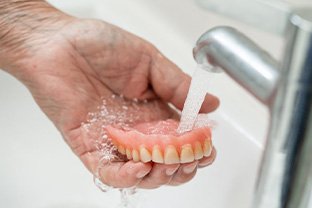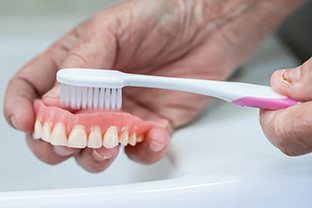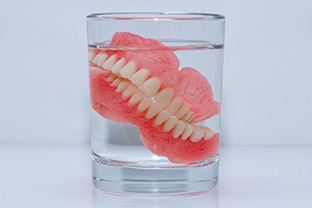Dentures – Peabody, MA
Restoring Smiles Effectively & Comfortably
 Tooth loss is prevalent throughout the United States, so you aren’t the only one if you’ve lost some or
all of your pearly whites. You may also be aware of the challenges of missing teeth, such as difficulty eating,
speaking, and smiling confidently. Fortunately, Dr. Spiro Saati can easily renew your full grin with dentures in
Peabody! These prosthetics are specifically tailored to match your natural smile and can help you regain certain
oral abilities that you’ve lost over time. Keep reading to learn more or call us today to schedule your appointment.
Tooth loss is prevalent throughout the United States, so you aren’t the only one if you’ve lost some or
all of your pearly whites. You may also be aware of the challenges of missing teeth, such as difficulty eating,
speaking, and smiling confidently. Fortunately, Dr. Spiro Saati can easily renew your full grin with dentures in
Peabody! These prosthetics are specifically tailored to match your natural smile and can help you regain certain
oral abilities that you’ve lost over time. Keep reading to learn more or call us today to schedule your appointment.
Why Choose Dr. Spiro Saati DMD for Dentures?
- Durable & Lifelike Restoration Results
- Completely Personalized Dental Treatment
- Cost-Effective Method for Renewing Smiles
Who Is a Good Candidate for Dentures?

People who are missing any number of teeth can be eligible for receiving dentures in Peabody. That said, you’ll need to have great oral health before undergoing the process, as we wouldn’t want any underlying or developing issues from interfering with it, such as gingivitis or an infection. During your initial consultation, our team will assess the condition of your mouth and address any problems we might detect before going forward with your treatment plan. If you need any preliminary procedures, we can provide them to ensure you’re healthy enough to wear dentures.
Types of Dentures

Dentures are incredibly versatile and can be tailored to address your specific dental needs. After looking over your oral health, our team can walk you through your options on how to restore your bite. There are generally three kinds of dentures to consider, including:
Partial Dentures

These prosthetics can help patients who’ve lost teeth while retaining some of their natural ones. They consist of a gum-colored base and artificial pearly whites that are supported via metal clasps that wrap around adjacent teeth. This allows them to stay secure and effectively restore a functioning bite.
Full Dentures

If you’re missing an entire arch of teeth, then full dentures are the ideal solution. Similar to partials, their base will blend with your gum line. However, they’ll rely on natural suction instead of any neighboring teeth to stay in position. You may require some denture adhesive to help keep them in place, but you’ll be able to enjoy a lifelike smile and incredible bite.
Implant Dentures

Instead of metal clasps or natural suction, implant dentures will be attached to your mouth via dental implants embedded in your jawbone. Once osseointegration is completed, you can expect to have superior stability for your artificial teeth. Not only does this option give you 80% or more of your natural chewing power, but your results can last several decades to a lifetime with proper care!
Benefits of Dentures

If you suffer from tooth loss, especially with multiple teeth missing, then you’ve already experienced how difficult it can be to do some simple tasks. Eating, speaking, and simply smiling with confidence all become herculean tasks that can drag down your mental and physical health. This is why dentures are so important as an accessible tooth replacement treatment. Read more below to learn how dentures from Dr. Spiro Saati can help you restore your smile and increase your quality of life. If you think they might be a good fit for you, call our office to set up a consultation.
Psychological Benefits

Restoring the functional aspects of your mouth is important, but it’s easy to overlook how tooth loss affects your mental health. Losing teeth can make you feel guilt, shame, and embarrassment. These feelings grow and can cause various stressful issues such as anxiety, depression, and strained relationships.
Restoring your teeth with dentures can fill the gaps in your smile and your confidence, improving your self-esteem. In turn, this will help strengthen your relationships and make socialization more enjoyable. In time, you may feel like a new person with a greater appreciation for your pearly whites than ever before.
Clearer Enunciation

Words are formed by complex movements between your tongue and the air escaping your lungs. Missing teeth can drastically interfere with this process, causing speech impediments like slurring, whistling, and mumbling.
With dentures, you’ll replace what was lost and allow your tongue and teeth to work in tandem once again. After a brief adjustment period, you’ll have fully restored speech faculties. This will make holding conversations with friends and family easier and more fulfilling.
Improves Nutrition

Many patients with missing teeth would rather skip over food they can’t chew instead of modifying it. Even when they do partake, their food often doesn’t get processed very well. This is just one more way that tooth loss can inhibit other bodily functions like your digestive tract. Over time, this can cause a chronic upset stomach, and other health issues due to lack of nutrition. Dentures solve this by restoring your ability to properly chew your food.
Preserves Oral Health

Almost as soon as a tooth is lost, the adjacent ones begin trying to move into the space it once occupied. While this is a natural response of your body to try to preserve your chewing function, it also leaves them vulnerable to wear and tear. The extra space around them can also become traps for food particles and bacteria to congregate. Dentures fill the spaces between your teeth, preventing the gradual shift and keeping our mouth healthier overall.
Expands Opportunity

Whether you’re a customer service representative, a front-facing salesperson, or simply work with many people every day, dentures can be a benefit to your career. One of the first things anyone notices when they meet a new person is their smile, for better or for worse. A confident and genuine smile with good aesthetics shows that you’re clean, dependable, intelligent, and approachable. These are the qualities that managers and prospective clients alike are looking for.
Understanding the Cost of Dentures

There isn't a flat fee for a new set of teeth because every mouth is as unique as fingerprints. Dr. Spiro Saati believes that your financial situation should never stand in the way of achieving your best smile. Our office offers the solutions you need to replace your lost teeth without costing you an arm or a leg. You won't have to compromise quality, aesthetics, or comfort to keep dentures within your budget.
Factors That Affect the Cost of Dentures

There isn't a set fee for dentures because there's a one-size-fits-all prosthetic. Every mouth and situation differs, and many factors affect the amount you'll pay, including:
Are Implant Dentures More Expensive?

Implant dentures are more expensive initially than traditional prosthetics, but they are the most cost-effective long-term. Dental implants have over a 95% success rate and are proven to last for decades with the right care. Traditional full dentures need to be replaced every few years, which can get costly over time. As a result, dental implants can end up paying for themselves down the road. Not to mention, they are the only method to replace both the roots and the crowns, giving you the next best thing to real teeth. You can't put a price on the benefits you'll gain by investing in dental implants.
Does Dental Insurance Cover Dentures?

You can use your dental insurance for your consultation and diagnostic services. Your benefits may cover any medically necessary preparatory procedures. You can use your insurance to cover some of the expenses of dentures, which are considered a major service. After meeting your annual deductible, you can use your yearly allowance to lower the amount you will pay. A member of our office will work on your behalf with your dental insurance to help you maximize your coverage to lower your out-of-pocket responsibility.
Other Options for Making Dentures Affordable

Besides using your dental insurance, we offer multiple options to keep dentures affordable, like:
Dentures Aftercare

Your dentures can beautifully restore the function and appearance of your smile, but it’s still crucial to practice excellent oral hygiene to ensure that they stay in great shape for as long as possible. Even if you have no remaining natural teeth, you’ll still have to receive regular dental exams and cleanings at our Peabody office to preserve the health of your mouth. These appointments also give Dr. Saati the chance to inspect your oral tissues for abnormalities that may be signs of oral cancer, and it can be very difficult to notice issues like these on your own if you wear dentures.
To keep your dentures functional and beautiful, stick to the following guidelines:
Remove After Eating

Following each meal, carefully remove and thoroughly rinse your dentures to wash away plaque and food debris. This will prevent unsightly accumulations that can lead to oral infections and bad breath. Whenever cleaning or otherwise caring for your dentures, remember not to use hot water, as the heat can deform the base of your appliance and cause it to lose its fit.
Clean Your Restoration

It’s important to remove your dentures for a thorough cleaning at least once a day. Using a soft-bristled toothbrush and a little bit of unscented hand soap, mild dish soap, or denture cleanser, gently clean every surface of each tooth your appliance has. Don’t use regular toothpaste, as it is abrasive enough to leave visible scratches on your artificial teeth. If you aren’t going to put your dentures back in immediately, soak them in a vessel of water or denture-cleansing solution to prevent them from drying out and warping. Before reinserting your dentures after soaking, thoroughly rinse them to prevent harsh chemicals from being placed in your mouth.
Keep Your Dentures Safe

When cleaning your dentures, fill the basin of your sink with lukewarm water and place folded towels across your countertop to create a cushion in case you drop them. It’s also important to keep your appliance out of the reach of small children and pets.
Remove Dentures When You Sleep

The mouth needs at least eight hours away from the dentures every day so that it has time to rest and clean itself. Continuous denture wear can lead to a host of oral health problems including soft tissue irritation, infections, bad breath, and erosion of gum or bone tissue. Sleeping with dentures is associated with a higher risk of pneumonia and greater levels of gum and tongue plaque, so most patients remove and soak their dentures before going to bed.
Notice Changes

Pay attention to the condition of your dentures and the way they fit and report anything unusual to your dentist. A few things to look out for include oral sores, gum irritation, signs of infection, and signs of not fitting properly such as shifting and clicking. If your dentures have been damaged, do not try to repair them on your own, as you may simply damage the appliance further. Instead, call our office so we can adjust, repair, reline, or replace your dentures.
Dentures FAQs
Do Upper Dentures Always Cover the Palate?
A traditional upper denture covers the roof of the mouth. Some patients have concerns about irritation or diminished taste, which are generally temporary. However, you can also choose from palette-less options, like those used for the lower arch. Your denture dentist in Peabody will help you choose the best style for your needs and preferences.
Can I Sleep with My Dentures in My Mouth?
Dr. Saati will instruct you to wear your dentures for 24 hours after receiving them. After the first day, you must remove them every night to keep your mouth healthy and to get the most from your investment. No one wants to be caught without their teeth, but your gums need a break. Your dentures will restrict blood circulation to your gums, which can lead to sores, inflammation, and pain when the soft tissues aren't given time to recuperate. Your mouth is also a hotspot for oral bacteria, especially at night. Wearing your dentures to bed can cause an overgrowth of bacteria that can lead to odors, infections, and damage your prosthetic over time. It's best to take your teeth out before calling it a day. Don't forget to brush them and place your dentures in an overnight soaking solution.
Can I Still Eat Steak with Dentures?
It is possible to eat steak with dentures, but it isn't something Dr. Saati will recommend because it puts wear and tear on your new chompers. If you can't resist a juicy steak, tenderize it before cooking it. Cut it into small pieces to make it easier to chew. A denture adhesive can give you more stability to prevent slipping and irritation.
Is a Broken Denture a Dental Emergency?
You rely on your dentures throughout the day. You can't go without any teeth. Therefore, a broken denture is a dental emergency. Stop wearing it to avoid oral injuries and additional damage. Do not attempt to fix it on your own with glue or adhesives. Instead, contact our office right away. We will get you into the office quickly for the necessary repairs or replacements.
Do I Use Regular Toothpaste to Clean My Dentures?
Toothpaste is abrasive, so it can scratch your dentures. This can make them look discolored and trap food residue that can cause unpleasant odors. Dr. Saati recommends using a soft-bristled toothbrush and a mild hand soap or dishwashing liquid. You can also purchase kits OTC made for cleaning dentures.